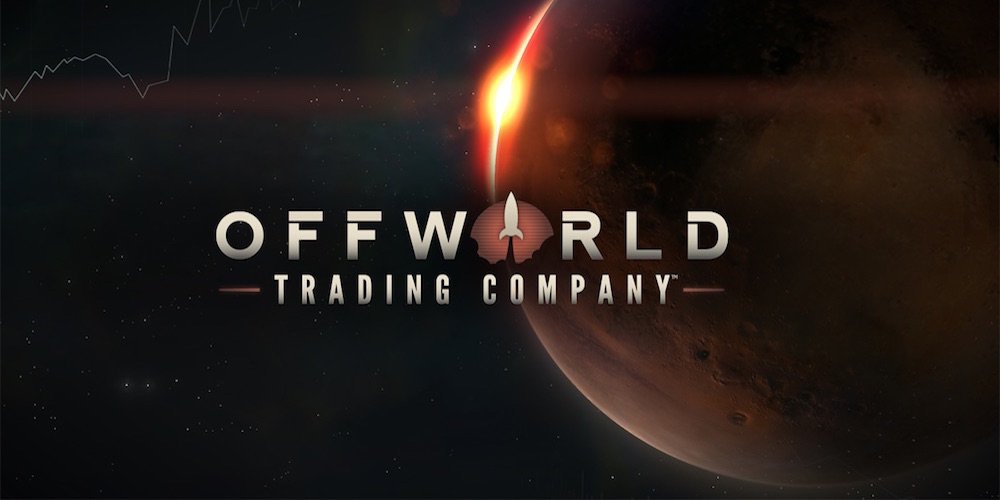
Offworld Trading Company (OTC) is the RTS game that I never knew I wanted. Nuanced unit control and micro-management are my favourite parts of RTS games, so I was rather unenthused when I heard about an RTS game lacking any form of combat or unit interaction. Fortunately, OTC more than makes up for it with the most in-depth and complex economy of any RTS game I’ve played, featuring 13 resources with a very complicated dynamic. OTC is a game about market manipulation, advanced resource management and corporate sabotage.
When playing OTC, you need to constantly keep an eye on the market price of all the resources and invest in what are the most valuable. But it’s never that simple, the interconnection of the resources creates the constant need for cost versus benefit evaluation. Food may be selling for a high price, but to produce food you require water, and if there isn’t any water nearby the cost of shipping it might be too much depending on the market price of fuel. Alternatively, resources are available for purchase, so you could just buy water to produce the food, but the constant demand would shift the price of water up, and if your opponent is already collecting water then they would make a big profit.

OTC requires critical thinking of weighing up opportunity costs and looking for the best opportunities to exploit. You need to be thinking about what’s the best way to invest in the most valuable resources while assessing your finances and tossing up between debt, capital and investment. Resource prices fluctuate depending on supply and demand, so you need to predict market changes and exploit it in your favour. Meanwhile, you should be searching for vulnerabilities to harass your opponents with Black Market powers.
The Black Market powers add another layer of complexity and create direct interactions between players. Some are useful for boosting your economy, but the primary use of the Black Market powers is to sabotage your opponent. Sabotage powers range from calling in the Filthy Pirates to intercept valuable shipments or using an EMP bomb to power off production structures. Effective use of Black Market powers can cost huge amounts of lost revenue which keeps both players on their toes, and factors into building placement and resource investment.
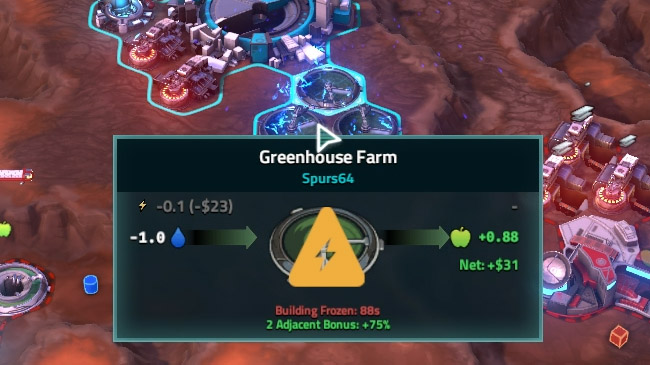
I’m having an absolute blast with OTC; I’ve already clocked over 100 hours on Steam and have no plans to stop anytime soon. Each match feels like a fresh new challenge since the procedurally generated maps with randomised resource placement and pricing eliminate the concept of a standard build order. I’m often not in the mood for the massive APM requirements of StarCraft, or can’t be bothered dealing with the frustrating moments found in Company of Heroes, OTC is my chill game for when I want to relax but still be challenged.
It only took me a few minutes of the tutorial to have me hooked. Most tutorials in RTS games are a boring chore, but OTC packs its tutorials full of humour, making them a pleasant learning experience. I didn’t bother with the campaign, but I played a fair bit of skirmishes versus AI before jumping into multiplayer because it was fun and challenging in a fair way. Most skirmish AI in RTS games are repetitive and shallow because it’s mainly just about learning how to abuse the AI’s flaws. The AI in OTC is far from perfect, but it’s mostly representative of fighting against real human players, a rare feat for an RTS game.
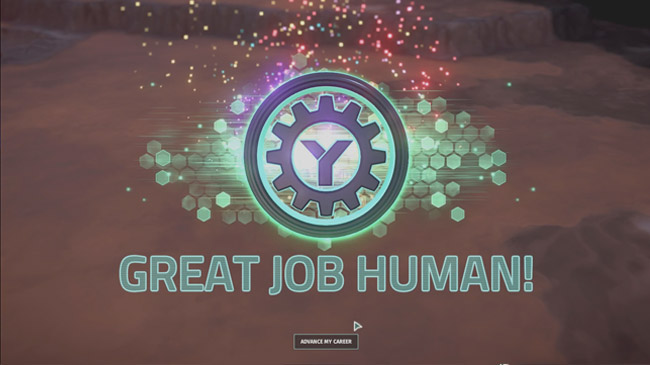
The compelling AI helps make OTC welcoming to new players; there’s plenty of fulfilment to be had in playing skirmishes at a comfortable pace without the need to rush into multiplayer. When a player does try multiplayer, it won’t feel like a different game with conflicting strategies. Unfortunately, there is still a lot left out by the tutorials and which you won’t learn when playing against the AI, so getting into multiplayer is still more difficult that it needs to be. A multiplayer specific tutorial would certainly be a nice addition, teaching new players the little nuances of the game which are essential to multiplayer.
Another reason why OTC is so accessible is how it doesn’t require speed and precision to play, someone new to RTS gaming isn’t going to be frustrated by their inability to execute strategies. On a more personal note, this means that as a YouTuber, I can play at an awful frame rate whilst I’m rendering a video, and with half a second lag during an upload, two things that I’m constantly doing. The lack of violence makes it suitable for children in particular, and would serve as a fun educational platform to teach them about complicated economic concepts such as debt, capital and price fluctuations. If I were to introduce someone to RTS for the first time I would start with OTC, especially since it should be able to run on most basic laptops.
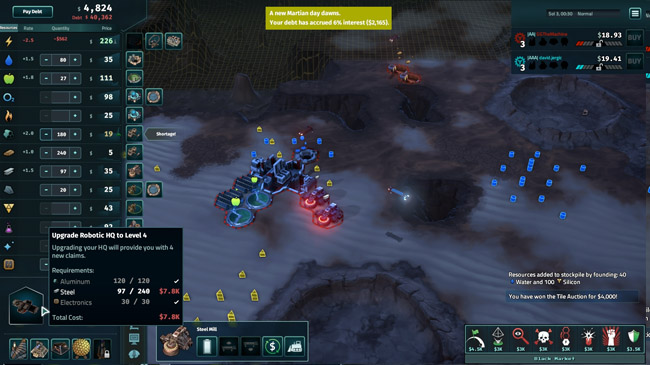
The presentation in OTC is superb, which I think is so important to nail in something this complicated. The game is gorgeous despite looking basic, which allows it to run fantastically and remain visually intuitive despite being so complex, not being afraid to represent resources on the map literally as coloured cubes. The UI is tidy and elegant, through the culmination of many small but clever design decisions such as the building icons being next to the resource they produce, instead of hiding them away in a separate menu.
I love how OTC clearly doesn’t take itself too seriously, which makes a game about market economies and managing debt way more fun than it deserves to be. The best example is all the laughs provided by the fun and goofy announcer, featuring classic lines such as “Buckle up, your economic Martian thrill ride is about to begin!” every time automatch loads you into a game. The soundtrack is an absolute pleasure to listen to and fits the tone of the game well, especially how it ramps up in intensity as your HQ techs up and the pace of the game increases.
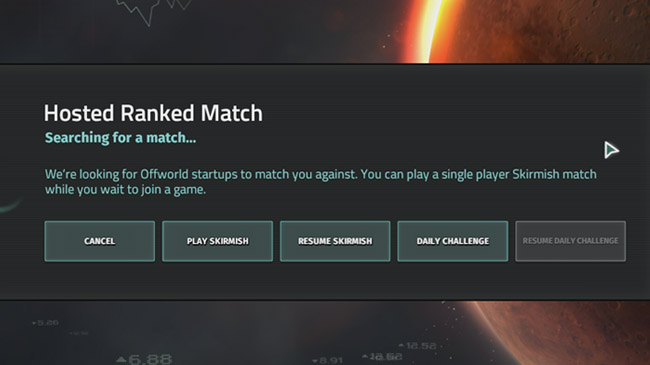
OTC has some truly ingenious features that I wish all RTS games shared. While you are queuing for a multiplayer match, you can play a skirmish game which will automatically save and exit when automatch finds you an opponent. Afterwards, when you’re queuing for your next match, you can resume the same skirmish that you played before! This is such an incredible feature that every RTS game would benefit from, as most RTS games have small communities resulting in long search times. In particular, I wish I could look through my last replay whilst queuing for a game in StarCraft 2.
Another excellent feature unique to OTC is the daily challenge. Every day, a new random skirmish challenge is created to see who can defeat it the fastest. The best part about the daily challenge is the leader board which alongside the player times links their replay. This allows the daily challenge to be a great learning tool, granting players an effortless way to learn the strategies of the top players in the community. Learning via replays is nothing new, but this makes it quick and easy since it’s all done through the main menu instead of through a third party website and externally loading replay files. It’s a great idea that would work even better if it were a multiplayer challenge so that players can learn from multiplayer replays instead of single player. The daily challenge also offers replayability to those who don’t want to play multiplayer or can’t due to an unstable internet connection.
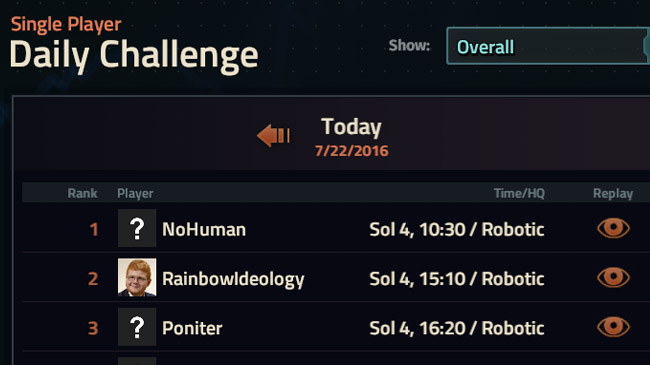
Despite my definite recommendation, I will mention my two main criticisms. The biggest complaint I have is that while the Black Market powers are a great addition, their implementation could be more consistent. Some rounds allow for more strategic diversity than others due to the random selection of powers at the start of each game. The utility powers grant flexibility to the player economies, but they’re not always available. I think the four utility powers: Bribe a Claim, MULE, Corporate Spy and Hologram, should always be available each match because they help make the game more complex. Though, I do like the random selection of sabotage powers since they factor into HQ placement and add to the uniqueness of matches
I’m also not a fan of the huge high risk/reward resulting from the defensive Black Market power, Goon Squad. If a sabotage power such as Mutiny is used on a building protected by a Goon Squad, the mutiny is not only negated, it’s also then given to your opponent who can use it against you for free! The Corporate Spy can be used to check if a tile is protected by a Goon Squad, but Corporate Spy isn’t always available and this sabotage transfer tends to stagnate the player interaction late game. I think it’d be better if Goon Squad no longer gave over the sabotage power in exchange for being cheaper and ramping up in cost slower.
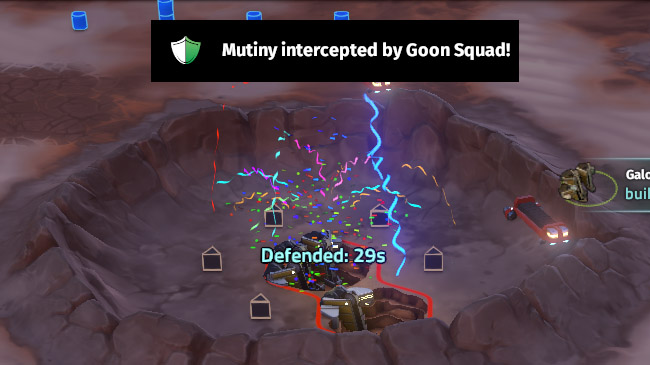
The late game is perhaps the weakest part of OTC; it can become quite one-dimensional and lacking in as much decision making compared to the early and mid-game since your land claims have all been exhausted and Offworld Markets are always the best way to make money. Sabotaging opponents can also become less viable since Black Market powers ramp up in cost and can become immune to harassment due to Goon Squads. I hope we can get some new content that spices up the late game by adding in some more buildings, Black Market powers and upgrades which grant more bonuses and means to interact with your opponent in the late game.
The other criticism I have is how random events that happen during a game can be overly punishing and cause unavoidable frustration. Players should always be investing in the most valuable resources, but random events such as weather storms and surpluses can make an investment less efficient. This can cause an opponent who invested in a less valuable resource to pull ahead. I like this in the late game because it spices things up and forces the players to react, but the early game is different. Random events can screw you over because investing in a resource early on is such a heavy commitment that you’re stuck with. OTC is not trying to be a super competitive game, but it’s just not fun being put behind because of something you had no control over, especially after you made the best decision. You can disable random events in custom games, but the ranked automatch games have them enabled.
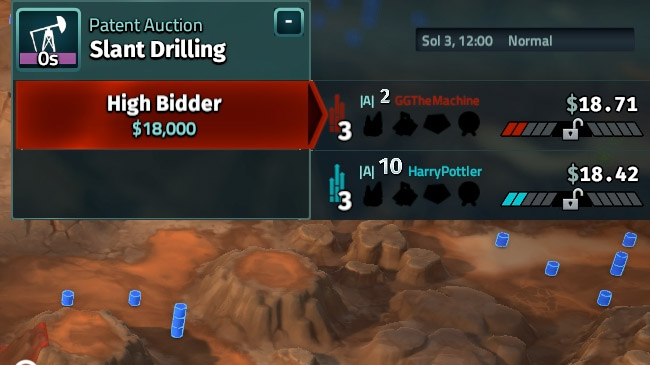
The Auction house is a more interesting and fair version of random events which can open up new strategies. Every few minutes, an item will go for up for auction that the players must bid on. It’s a solid mechanic because the players must decide how much they are willing to spend on acquiring or denying the valuable items which can shake up the state of the game. If there’s an upgrade that benefits only one player, you can force them to pay a hefty amount for it. I think it’s important in an RTS game to let the players feel like they are always in control and responsible for outcomes.
Regardless of my nitpicking, after so many crappy Command and Conquer clones, it’s wonderful to see a truly innovative RTS game with a unique artistic vision. The shift away from producing and microing units makes OTC accessible to new players that might have been put off by most RTS games. Some RTS try to be accessible through over simplifying, but all that achieves is making a bland and shallow game which players will get bored of and move on. Perhaps the first of it’s kind; OTC proves that an indie studio can develop a successful modern RTS game. Mohawk Games managed their priorities brilliantly, neglecting unnecessary voice acting and cutscenes in favour of polish, balance and features such as rebindable hotkeys and replay support.
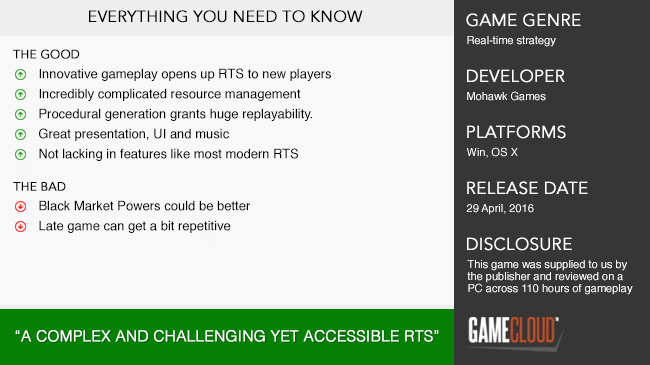
Offworld Trading Company is a fantastic new spin on RTS that replaces unit production and micro with the most complex economic management found in the genre. The great tutorial and skirmish AI make it fun and easy to get into, whilst the lack of player speed and precision requirements make it a non-stressful experience and friendly for new RTS gamers. The procedural generation of maps makes every match feel fresh and unique, giving the game endless replayability. This huge amount of complexity is gently layered underneath the slick UI, intuitive design, a beautiful soundtrack, and all the important features for an RTS game. If you’re a fan of the genre, it’s absolutely worth a look.











